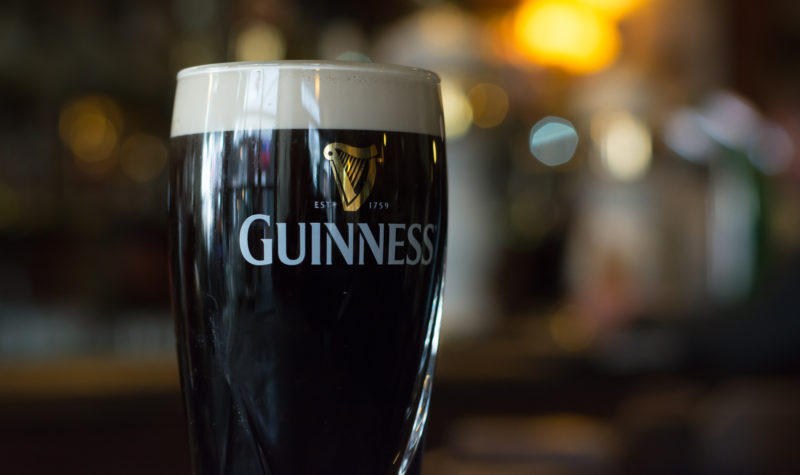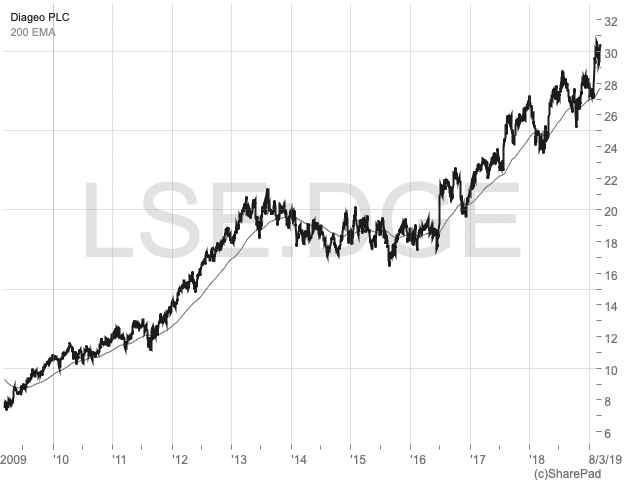Why investors keep toasting Diageo

Companies that offer a mix of growth and defensive qualities are hard to find. Usually, stocks are classed as either ‘cyclical’ or ‘defensive’, with hybrid opportunities being limited. At the moment, though, investors may be seeking stocks that can offer the best of both worlds. Risks to not only the UK economy, but also the world economy, appear to be mounting. At the same time, however, there is likely to be a desire for growth opportunities among many investors.
One stock which could offer investment potential given current economic conditions is FTSE 100 alcoholic beverages business Diageo (LON:DGE). The company has a diverse business model, with it operating in 180 countries across the world and having a large range of popular, premium brands. The nature of the alcoholic beverages industry means that demand may remain robust relative to other industries – even if the global growth outlook deteriorates.
The company’s growth potential could be boosted by an efficiency strategy which is set to improve margins over the medium term. It is also seeking to deliver further product innovation, while benefiting from growing demand for premium beverages in a variety of markets. With rising consumer demand expected to be reported in emerging markets as wages rise, the company could justify what remains a rather high valuation.
Innovation and demographics drive growth potential
Diageo is seeking to build a stronger sense of loyalty among its customers through the release of increasingly innovative products. It is aiming to understand and adapt to changes in consumer tastes in order to keep its range of brands relevant. For example, in response to an increasing trend among consumers for more natural ingredients, it has released Ketel One Botanicals vodka. It has no artificial flavours or sweeteners, as well as no added sugar. The company has also released Gordon’s Premium Pink Distilled Gin in the UK, which contains only natural fruit flavourings. It has been the most successful new spirits launch of the last decade, and suggests that further innovation could strengthen the company’s product portfolio.
| First seen in Master Investor Magazine
Never miss an issue of Master Investor Magazine – sign-up now for free! |
The business is seeking to enhance the strength of its brands in order to capitalise on demographic change and rising incomes in a large number of its markets. The premium status of many of its brands can be seen in last year’s San Francisco World Spirits Competition, where it was awarded 72 medals. Alongside premium quality products, it is seeking to deliver stronger personal connections between consumers and its brands. Examples of how it is seeking to do so include a visitor experience in Edinburgh which is focused on its Johnnie Walker whisky brand, as well as a new Bulleit visitor centre in Kentucky which celebrates its Bourbon.
The aim of such moves is to take advantage of the growing popularity of premium alcoholic beverages. The company forecasts that there will be 730 million new consumers across the world who will be able to afford premium spirits over the next decade. This could drive growth across its brand portfolio, with a premium focus likely to allow for greater product differentiation and a competitive advantage.
Many of those new consumers are likely to be from emerging markets. Diageo has consistently sought to strengthen its exposure to developing markets. For example, it recently increased its stake in China-focused Sichuan Shuijingfang Company from 39.7% to 60%. This may enable it to capitalise on China’s GDP growth, which is forecast to remain above 6% per annum through to 2022. With the Indian economy expected to grow by at least 7.5% per annum during the same time period, it is unsurprising that the country is one of its key investment areas in the developing world.
Alongside the potential for growth, the company is also aiming to improve its efficiency. It is in the process of refocusing its portfolio towards core brands where it feels it has the most appealing risk/reward opportunity. As part of its strategy, margins are expected to increase. In its most recent trading update, for example, the company stated that it is on track to report a rise in its organic operating margin of 175 basis points over the three years to June 2019.
Dependable growth in an uncertain world
The prospects for the world economy are, of course, highly uncertain at the moment. A number of risks could cause global GDP growth to come under pressure. For example, the trade relationship between the US and China is at a low ebb, with both countries having placed tariffs on imports as part of increasingly protectionist policies. The IMF estimates that such tariffs, as well as the ones put in place by the EU, Canada and other countries in recent years, could wipe as much as 50 basis points from global GDP growth by 2020.
Alongside increasing protectionism, risks such as Brexit, rising US interest rates and a slowing Chinese economy could cause the growth outlook for a number of stocks to become less certain. With Diageo operating in 180 countries and its sales and profitability being spread relatively evenly across multiple continents, it is not overly reliant on one single country or region. This may help it to deliver improving financial performance even if specific countries or regions see their growth rates decline over the medium term.
The nature of the alcoholic beverages business also means that the company enjoys relatively inelastic demand for its products. Consumer loyalty is high across the industry – especially among premium beverages – and this could provide the company with a significant amount of pricing power. Therefore, even if volume growth is less impressive than forecast, there may be scope to offset this with a more aggressive pricing strategy that allows the company to generate top and bottom-line growth in a variety of economic circumstances. Given the uncertainty present across the world economy, a wide economic moat such as that enjoyed by Diageo could become increasingly desirable to investors who are becoming more aware of the potential risks facing many global stocks.

Fundamentals: premium brands, premium rating
While the FTSE 100 has fallen by around 9% since reaching an all-time high in May 2018, the Diageo share price has moved 10% higher. Its outperformance of a wide range of its index peers means that while they have seen their valuations move down to more appealing levels, the alcoholic beverages company continues to trade on a relatively high valuation. For example, using last year’s earnings per share figure of 118.6p, it has a P/E ratio of 25.6. For a stock that is due to post earnings growth of 7% in the current financial year, this may suggest that it fails to offer a margin of safety at a time when many other FTSE 100 stocks trade on low earnings multiples.
Although a debt-to-equity ratio of 85% is relatively high, the stability and resilience of the company’s business model suggests that it is not a major concern. Moreover, its net finance costs were covered 14.2 times by operating profit in the last financial year. This indicates that the company is unlikely to experience major financial challenges should interest rates continue to move higher over the next few years. A dividend yield of 2.2% is low, but yet unsurprising, given the strong performance of the stock relative to the wider index in recent months. The company expects to grow dividends per share at a mid-single digit percentage rate over the medium term.
Investment appeal
At a time when the global economy faces a number of potential threats, the defensive appeal of Diageo could become increasingly attractive. The company has a diverse range of products which enjoy a relatively high degree of customer loyalty. This could provide it with pricing power that may be able to offset weaker volume growth should the world economy experience a downturn. The company’s wide geographical spread may also mean that it is able to avoid potential risks facing specific countries or regions, with it not being overly reliant on one part of the world economy for its sales and profitability.
| First seen in Master Investor Magazine
Never miss an issue of Master Investor Magazine – sign-up now for free! |
While investors may be somewhat cautious at the moment, growth stocks are likely to remain appealing. On this front, Diageo’s strategy could provide a growth catalyst over the medium term. It is becoming increasingly innovative, with it seeking to keep up with changing consumer tastes. Its premium products may also become more popular among consumers at a time when wage growth across large parts of the global economy is set to increase its total addressable market over the next decade. Its increasing focus on emerging markets may also enable it to capitalise on the fastest-growing regions of the world economy. Meanwhile, an efficiency programme could create a more profitable and stronger business for the long term.
Although Diageo’s valuation is relatively high, a mix of defensive characteristics and its growth potential could mean that it is able to justify its current P/E ratio. A high debt level is unlikely to prevent investors from remaining bullish about the stock’s prospects, although its dividend yield is unlikely to make it an obvious income choice. However, for investors who are seeking a mix of defensive characteristics and growth potential, the company could be a worthwhile buy for the long term. It could outperform the FTSE 100 in a variety of future scenarios.

Comments (0)